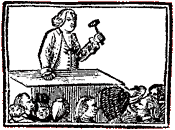“The Negroes shall be free, and the Liberty Boys slaves”?
 As I described back here, on the night of 28 Oct 1768 Capt. John Willson of the 59th Regiment was reportedly heard “to persuade some Negro servants to ill-treat and abuse their masters, assuring them that the soldiers were come to procure their freedoms.”
As I described back here, on the night of 28 Oct 1768 Capt. John Willson of the 59th Regiment was reportedly heard “to persuade some Negro servants to ill-treat and abuse their masters, assuring them that the soldiers were come to procure their freedoms.”
The next day and again on Monday, 31 October, the Boston selectmen’s official business included “Taking Depositions relative to Capt. Willson & Negros.” Selectman John Rowe’s diary confirmed that “they were all present” for the Saturday discussion.
One result of those meetings was officially that “The Several Constables of the Watch [were] directed by the Selectmen, to be watchful of the Negros & to take up those of them that may be in gangs at unseasonable hours.” Or as the Boston Whigs interpreted it for newspaper readers in other ports:
In consequence of the late practices upon the Negroes of this town, we are told that orders have been given by the Selectmen to the town watch, to take up and secure all such Negro servants as shall be absent from their master’s houses, at an unseasonable time of night.It’s notable that the selectmen’s directive specified “those of them that may be in gangs” while the report for other colonies referred to “all such Negro servants.” In practice the watchmen probably were stopping all black people, in groups or alone, enslaved or free. Not that there was any real evidence for an incipient uprising.
The selectmen also took action in the court system. The Whigs’ “Journal of Occurrences” reported on 31 October, 250 years ago today:
The following complaint was regularly made this day, vizBoston elected seven selectmen, but only six signed this complaint to the magistrates. Who was the seventh? None other than John Ruddock, one of the magistrates who took the complaint. Bostonians must have known that he’d been in the discussion that led to that legal action before him. But people in other American ports wouldn’t have spotted that maneuver.
to the worshipful Richard Dana and John Ruddock, Esqrs. two of his Majesty’s justice of the peace for the county of Suffolk, and of the quorum.
The subscribers Selectmen of the town of Boston, complain of John Willson, Esq; a captain in his Majesty’s 59th Regiment of foot, a detachment whereof is now quartered in the said town of Boston, under his command, that the said John, with others unknown, on the evening of the 28th day of October current, did, in the sight and hearing of divers persons, utter many abusive and threatening expressions, of, and against the inhabitants of said town, and in a dangerous and conspirative manner, did entice and endeavour to spirit up, by a promise of the reward of freedom, certain Negro slaves in Boston aforesaid, the property of several of the town inhabitants, to cut their master’s throats, and to beat, insult, and otherwise ill treat their said masters, asserting that now the soldiers are come, the Negroes shall be free, and the Liberty Boys slaves—to the great terror and danger of the peaceable inhabitants of said town, liege subjects of his Majesty, our Lord the King, and the great disturbance of the peace and safety of said town.
Wherefore your complainants, solicitous for the peace and wellfare of the said town, as well as their own, as individuals, humbly requests your worship’s consideration of the premises, and that process may issue against the said John, that he may be dealt with herein according to law.
Joshua Henshaw
John Rowe
Joseph Jackson
Sam. Pemberton
John Hancock
Henderson Inches
The next day, 1 November, the Whigs reported:
In pursuance of a complaint made to Mr. Justice Dana, and Ruddock, relative to Capt. Willson and others, a warrant was issued by those justices for taking up said Willson and bringing him before them, which was delivered to Benjamin Cudworth [1716-1781], a deputy sheriff of the county, who being opposed in the execution of it, applied to the high sheriff [Stephen Greenleaf], who with divers constables went to apprehand him; at first he also met with opposition from one of the officers, but the said Willson soon after surrendered himself to the sheriff, who brought him before the justices at Faneuil-Hall, which was crowded with people; and after the examination of divers witnesses upon oath, the complaint, was so well supported, that the justices ordered him to become bound with sufficient sureties for his appearance at the Superior Court in March next, to what shall then be alledged against him, touching the matters complained of, as also for his good behaviour in the mean time.Sheriff Greenleaf had tried to seize the Manufactory for the Crown earlier in the month, but here he was taking Capt. Willson before the law. In both cases, Greenleaf was doing his main job to serve legal papers. (He wasn’t a peace officer the way we picture sheriffs in the Old West.) The magistrates held their hearing in Faneuil Hall, “crowded with people,” which only a couple of days before had been crowded with troops.
John Rowe recorded the 1 November action in his diary, “Capt. Willson was carried before Justice Dana for some Drunken Behaviour & bound over to the Sessions.” Rowe had signed that formal complaint, of course. But privately he referred to Willson’s alleged incitement to bloody rebellion merely as “some Drunken Behaviour.”
As usual, Rowe was playing both sides. He spent part of that evening socializing with James Otis, William Molineux, and other Whiggish merchants and the rest at a gathering with Gen. Thomas Gage, Col. James Robertson, Col. William Dalrymple, Col. Maurice Carr, and other high-ranking army officers.

No comments:
Post a Comment